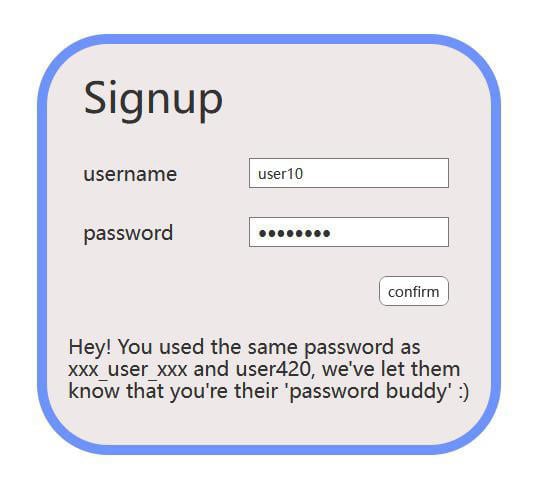We’ve all been there.
I too love the Password game! Please save Paul! ~I truly care about him!~ Truly!
(Sorry, I sometimes like to post really bad comments…)
Haha this is great, got to the chess part before giving in

Same. My country was Jordan. Took way too long to figure out, because it dropped me in the middle of an empty amphitheater with no visible road signs, license plates, etc…
Qxh6
I’m starting to want to learn chess after learning about the password game. I need to go get further!
Bruh, it just made me google dork to find out where a random street view was. 10/10 would recommend
Have you been given the egg yet? Don’t forget to feed him!
My Roman numerals should multiple to equal 35, but then the county I got starts with a C… how do you multiply by fractions in Roman numerals?!
You don’t need capital letters in the country name
Don’t you have to delete paul to win?
I haven’t known that one yet, hilarious :)
Man, when I played, poor Paul got burnt to a crisp. I’m still having flashbacks from that shock.
“Sorry, that password is already in use” ruins it for me. That’s not a realistic message to receive.
Maybe “Your password cannot be one you’ve used previously”.
Should be: “your password cannot be one of your last 24 passwords”
Especially for those places that want your password changed every two weeks.
If they want to play that game - the calendar date becomes part of the password. It’s never the same, but you can always work it out!
Or just append a letter that increments every time you change your password, and keep a note of what the current letter is.
Passworda
Passwordb
Passwordc
…When your z password expires, just wrap back around to a.
At my work they wanted better security, and made the rule of minimum 12 characters, must include all sorts of numbers, special characters, etc, no previously used password and it must be changed every month, 3 attempts then the account is locked and you have to call IT.
The result was that people wrote their passwords on post-its on the screen, so it led to worse security overall and they had ro relax the rules.
It follows the vein of some of the password rules and feedback reducing security itself. Like why disallow any characters or set a maximum password length in double digits? If you’re storing a hash of the password, the hash function can handle arbitrary length strings filled with arbitrary characters. They run on files, so even null characters need to work. If you do one hash on the client’s side and another one on the server, then all the extra computational power needed for a ridiculously long password will be done by the client’s computer.
And I bet at least one site has used the error message “that password is already in use by <account>” before someone else in the dev team said, “hang on, what?”.
It’s true, most of these rules are harmful, but also most are in common use and accepted, for some reason. I have heard of a password system that had that warning, perhaps even the account, but it was in a softwaregore screenshot context.
It shouldn’t be.
But it is.
Should say by who. :)
Sorry, that password is already in use
BIG red flag. Abort. Abort.
Also I love when they only support certain special characters. So the psuedo random noise created by my password generator won’t work until I curate out the unsupported characters.
I was changing my password on a pretty big company website the other day.
The password generated by my password manager kept giving me a http error (500 I think)
I generated a new password and deleted all the special characters other than the obvious ones. Boom, worked first time.
So looks like someone is not sanitising their inputs properly.
I sent them an email so hopefully they will fix.
Password1’); DROP TABLE Passwords;–
Robert’); DROP TABLE Students;–
I sent them an email so hopefully they will fix.
One can only hope. But based on my experience, they usually do not. I once sent an email to Microsoft telling them that their Microsoft account app had a vulnerability, and I even sent them the XML line they needed to add to their Android Manifest to fix it, and they wouldn’t do it because it required physical access to the device to exploit. I mean, that’s fair enough, but it was literally one line of code to plug the hole.
They eventually did add that line about 6 years later.
It boggles sometimes.
I remember about 2015 (?) In the vicinity anyway, PayPal has a 12 character MAXIMUM on their passwords.
PayPal, you know the place where you can literally transfer all the money. A 12 character MAXIMUM
I emailed them to suggest they change this requirement. And they replied saying that 12 characters was sufficient if you used special characters and numbers.
Glad they have finally changed it now.
My bank has an 8 character limit. Not minimum, limit
deleted by creator
Funniest thing was when I registered on a website which parsed the \0 sequence and hence truncated the password in the background unbeknownst to me. This way you could circumvent the minimum length and creare a one character password.
Once I registered on a website. I used an auto generated password. Next time I tried to log in to the website I was confused that my stored password didn’t work. Requested to change the password, but I used the stored password again. To my surprise, it said the password must be different from the current one.
After a bit back and forth I finally figured it out. Apparently the site had a max length on the password. Any password longer than that is truncated. This truncation wasn’t applied in the login form. Only when creating a password.
I always just refresh the password until I get a random one without the characters the randomly choose to forbid 😂
The worst part is that if they know that password is already in use… then they aren’t storing their passwords appropriately.
You could store the passwords as hashes and just compare the hashed value.
yes, but then they are not salted, which is what they should be doing.
True, but for the same big O they can salt the password for each user and compare it to what they have stored. My big pet peeve (that I’ve actually seen) is when they say your password is too similar to an old one. I have no idea how that could be reasonably done if they’re storing your password correctly.
But are they peppered?
Good call.
My favorite, though, is:
types in password “Password incorrect” goes to reset password “please enter a new password” types in password “your new password cannot be the same”
That just means you entered it wrong the first time.
Sometimes it means the page checking the password is following a different ruleset eg. the main page is case sensitive and the change password page isn’t. Sometimes it’s stuff like the entered password is silently truncated to a fixed number of characters and because of that won’t let you log in. Sometimes it’s wierd character expansions being passed directly to the password checking routine (& or similar).
i have had this happen on some websites occasionally while using my password manager.
It often means that one could have derived the correct password from the set of rules - but those rules are not shown when asking for the old password
Exactly this. I want to normalize showing the password requirements when you don’t immediately get the password - if you made me jump through hoops the first time, at least remind me what they were!
Lol, at this point just generate a password for me to save in my bitwarden.
deleted by creator
Because it’s much more fun to come up with passphrases like Correct Battery Horse Staple.
It’s a lot easier to remember that than #@?Zk23!nPw
You are not supposed to have to remember anything but your master password. :)
I’d rather try and remember than have a single point of failure for all my accounts’ security.
If the passwords are stored offline then I can’t get at them if I’m away from where they’re stored. If they’re stored online they’re not secure.
Some are online, but encrypted, with options to export the passwords in case the service goes down.
“Why should I trust them?”
Well, the software is open source, and regularly audited by people using it. Many password managers, such as Bitwarden (not sponsored, although I’d like to get a sponsorship) uses end-to-end encryption to secure the passwords so someone hacking the servers or a rogue employee can’t access anything, It would just look like random noise. You don’t have to know coding, you just have to trust that someone in the world will have the knowledge to inspect the code and report any suspicious code. Just regularly back up the passwords to a local file so you still have them in case they shut down.
Trying to remember passwords made me constantly stressed trying to remember them. A password made life much easier. Better than a single point of failure like your brain. One password is much easier to remember, and that one password can be as complex as you want, because that’s the only one you’d have to worry about.
Sincerely,
Someone who’s depressed af and constantly forget passwords
Encryption can be decrypted. A password manager encrypting your passwords is like saying your car has working brakes. It’s totally unsafe to even consider operating without but it doesn’t say much when it is there.
It’s not a matter of “why should I trust them” but “why should I trust them more than the system that already exists”. I get the appeal, but the hole is big.
If I forget a password I reset it. If I forget my manager’s password can it be reset? Is the reset option, if extent, susceptible to attack?
If an account gets compromised it could have moderate repercussions, but probably minimal depending on the account, with maybe a couple exceptions. If managed passwords get compromised that’s potentially everything. There has not, and likely never will be, an impenetrable system, so it is a possibility if not a concern.
deleted by creator
Tacking onto this, because I mix password types too, I don’t want all my passwords in the same (even pseudorandom) style.
Yeah, I switched from LastPass (after one of their many data breaches) to 1Password. I don’t know any of my passwords anymore because they’re all just generated and saved automatically. And that’s a good thing.
Tons of websites reject pseudo randomly generated passwords, too
deleted by creator
That’s inherently blocking pseudo random password generators.
Max length doesn’t bother me if it’s at least 128 characters, but only allowing specific special characters is a sin.
As of last year, Wells Fargo’s passwords were even cause insensitive. Dunno if they’ve fixed it since then, but probably not
Because I want control of my passwords in my head not some software, it’s not like a string of random characters is any more secure than one that can actually be remembered
deleted by creator
Yes because I have an easily remembered system for a unique passphrase for any given site. Not trying to shit on password managers though, just providing a different perspective
My favorite is when you forget your password and try to reset it but it cries that you can’t use passwords you already used
Mother fucker if I remembered what I used I wouldn’t be doing this
For those wanting to play this as a game, there is this wonderfully fiendish website.
https://neal.fun/password-game/
Rule 13 Your password must include the current phase of the moon as an emoji.
I got stuck on the chess one. Used to think I was pretty decent at the game. After a few tries I gave up and tried a few websites that claim to be able to solve it and none found the “correct” move.
“Chessify” on Android worked for me (also has the advantage that you just take a picture, instead of setting up the position by hand). Unfortunately 1 minute later the game gave me a chicken that I had to keep fed with worm emojis, so I created a stockpile of worms for the chicken and it died of overfeeding. I rage quit the game on the spot.
The worst one is when it only supports up to like 16 characters but doesn’t tell you so it will only use the first 16 characters and ignore the rest. The next time you need to enter it and get the 64 character password from your password manager it will just say it incorrect and you’re left with no idea on why it’s wrong.
Holy shit you might have just explained why I have to reset my password every time for a local fast food joints own website
This was me on a bank’s site till I clued in that I need to shorten my password.
So secure even you don’t know the password. It’s like built in MFA.
Why do you have an account for your local fast food joint?!
so he can get even faster food? idk
To order through their site, I try to use the places own sites instead of justeat etc so they get more of the money. As you can imagine they aren’t the best websites though.
You can’t just order per telefon?
I can do you one worse.
My banking app password was not case sensitive for many, many years. They finally fixed it a few years back though!
Sometimes there’s a limit on the length but it’s only imposed by the JavaScript of the website, so I can use my password manager to insert the text directly into the field but I can’t actually type it in.
😐
I think walmart.com was or is that way. Took me a while to figure that crap out.
This has happened to me so many times. Frustrating and stupid being belief. Are they hiring 10 year olds to write the html/script? Sheesh.
deleted by creator
I’ve seen this but with a final message of “Sorry, that password is already in use by user about2getOwned@gmail.com.”
- Login to their account
- Change their password to something else
- Set your password
But what if the password you want to set is already in use?
Refer to my above comment until that is no longer the case.
Looks like someone’s been playing the password game https://neal.fun/password-game/
That game made me want to punch.
This is one of the reasons why I am totally dependent on my password manager now.
60 character alphanumeric randomly generated password: sorry, that password is not secure enough, please include a special character
Type “Letmein69!” : perfect, very secure password
Me: 🤨
Yeah that really bugs me.
Like come one, “Ma5terp!ece” is more secure than “Regain Refinance Clarify Cuddle9”
Maybe in bizaro world.
Fuck. I gave it a try for real this time and hit a permanent game over condition.
spoiler
Apparently you can overfeed Paul
Darn, I wanted to see what came next. Some of those rules were hilarious.
That was my limit too!
Thank you, I’m thoroughly annoyed.
Me too.
I got to the “wordle” one before giving up. jesus lol, nice meme
It was crone btw.
wow, spoilers /jk
Had to give up at rule 20 because I was using a phone.
Spoiler
As much
funpain as that was, highlighting with a touch screen is nowhere near fast enough to put out the fire.Would love to see a speedrun leaderboard for this, though.
deleted by creator
Unfortunately a lot of jobs require passwords and they use outdated security processes, forcing people to have the old fashioned “must have uppercase, lowercase, number, and special character & you have to change it every 3 months for no reason” passwords instead of the stronger (and less annoying) alternatives.
i signed up at mba.com and it wouldn’t let me use a password because it contained a semicolon which wasn’t on the approved list of special characters, and then - get this - because I tried too many times to create a password - locked me out because I had “too many failed attempts”
Sounds like it’s prime time for a SQL-injection
Those requirements drive me crazy, especially because they’re all against NIST recommendations. Someone thinks they make passwords more secure but they have the opposite effect.
At any rate, password managers still help in those cases. If nothing else, for providing a safe place to record what your password is for when you forget it because of the dumb requirements.
I always wonder if such choices come from incompetent IT, or if IT wants to do things better but is banging their heads against corporate owners who think “more hassle = more secure”.
that’s exactly why a password manager works. there’s a generator that you can configure to meet requirements
Must be changed every month, can’t use a previous password, AND, for some fucking reason, can only contain 8 characters.
And if you forgot your password, you can call IT and they’ll just read it to you because they have them all saved somewhere.
That was a great place to work at.
Still frustrating. I generally try to make my passwords all lowercase in case I need to type them (especially on a phone). But a lot of places don’t allow that.
deleted by creator
If I’m typing on a computer keyboard, typing words is easier than random letters, but on a phone it doesn’t make much of a difference. What I end up doing is typing my passphrase into my password manager on the computer, and then typing the password on there into my phone.
I do have a password manager app for my phone, but then I have to type the whole passphrase into it so I don’t use it unless necessary.
Password can’t exceed 32 characters
Garbage
i wouldn’t even mind if it was 32. 32 is a damn strong password.
I’ve seen as low as 10 digits in the past
My Wells Fargo password used to be max 8 characters, and when you use the phone you you can basically use the keypad to log in.
So it’s basically 8 DIGITS
Wow, super secure!
32 is a damn strong password
Not necessarily: only if it’s generated properly, and only for the moment - that will change in the next few years.
You do realize that length and symbol type are only 2 out of many other factors that go into a strong password?
Ok, fair, not all 32 digit passwords will be secure.
11111111111111111111111111111111 is not secure, but I was trying to imply, in a properly generated password, 32 digits long is very secure.
but I was trying to imply, in a properly generated password, 32 digits long is very secure.
I understand, and I think you make a valid point as far as the discussion is concerned.
It’s unfortunately still a little more complicated than that, though.
Like I said, there’s more to a password than length and symbol type.
Even something like cF*+@aXbIdFHje2vZiU-1 is less secure than if it were generated by a good PRNG.
D0@ndro!dsDr@3@m0f3l3ctr!cSh33p? is also insecure, though it might have been considered secure 4-5 years ago.
You see what I’m saying?
Then of course there’s hash algorithms and how those are used to authenticate the passwords themselves, etc.
You think that’s bad, a decade ago I had to use a government-run website that required passwords be exactly 8 characters


























